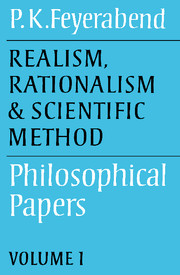Book contents
- Frontmatter
- Contents
- Introduction to volumes 1 and 2
- PART I ON THE INTERPRETATION OF SCIENTIFIC THEORIES
- PART 2 APPLICATIONS AND CRITICISMS
- 8 Introduction: proliferation and realism as methodological principles
- 9 Linguistic arguments and scientific method
- 10 Materialism and the mind–body problem
- 11 Realism and instrumentalism
- 12 A note on the problem of induction
- 13 On the quantum theory of measurement
- 14 Professor Bohm's philosophy of nature
- 15 Reichenbach's interpretation of quantum mechanics
- 16 Niels Bohr's world view
- 17 Hidden variables and the argument of Einstein, Podolsky and Rosen
- Sources
- Name index
- Subject index
12 - A note on the problem of induction
Published online by Cambridge University Press: 05 June 2012
- Frontmatter
- Contents
- Introduction to volumes 1 and 2
- PART I ON THE INTERPRETATION OF SCIENTIFIC THEORIES
- PART 2 APPLICATIONS AND CRITICISMS
- 8 Introduction: proliferation and realism as methodological principles
- 9 Linguistic arguments and scientific method
- 10 Materialism and the mind–body problem
- 11 Realism and instrumentalism
- 12 A note on the problem of induction
- 13 On the quantum theory of measurement
- 14 Professor Bohm's philosophy of nature
- 15 Reichenbach's interpretation of quantum mechanics
- 16 Niels Bohr's world view
- 17 Hidden variables and the argument of Einstein, Podolsky and Rosen
- Sources
- Name index
- Subject index
Summary
The so-called ‘problem of induction’ comprises many different but related questions. This variety is in part due to the difficulty of finding a satisfactory solution: older formulations are given up and are replaced by weaker problems in the hope that what is impossible to prove in the strong case might perhaps yield to proof in a weaker case. Roughly, the development is as follows.
Originally it was believed that the conjunction P(a1) & P(a2) … & P(an), or P(n) for short, could in some way guarantee the truth of (x)P(x). (The predicate ‘P’ occurring here may be expressed in ordinary English (‘being black, provided one is a raven’); it may be expressed in terms of physics (‘moving on a straight line with constant speed with no forces present’); or in terms of some other discipline. This way of defining P allows us to state any theory in the form (x)P(x).) This assumption, which I shall call the simple generalization hypothesis, leads to this programme: to discover, and to state explicitly, the specific inferences according to which (x)P(x) can be obtained from P(n). The hypothesis was refuted by Hume, who also showed that the corresponding programme could not be carried out. Next, the simple hypothesis was replaced by the assumption that P(n) might guarantee a high probability (in the objective sense) of (x)P(x). Hume's argument refutes this hypothesis also (the disproof was provided already by Hume himself).
Information
- Type
- Chapter
- Information
- Realism, Rationalism and Scientific MethodPhilosophical Papers, pp. 203 - 206Publisher: Cambridge University PressPrint publication year: 1981
